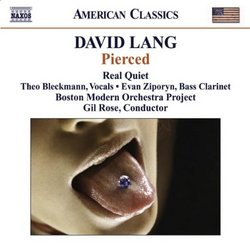| All Artists: Real Quiet Title: David Lang: Pierced Members Wishing: 0 Total Copies: 0 Label: Naxos American Original Release Date: 1/1/2008 Re-Release Date: 11/18/2008 Genres: Pop, Classical Styles: Vocal Pop, Chamber Music, Historical Periods, Classical (c.1770-1830) Number of Discs: 1 SwapaCD Credits: 1 UPC: 636943961520 |
Search - Real Quiet :: David Lang: Pierced
CD Details |
CD ReviewsGood to see Naxos branching out C. D. Shirley | Chicago, IL | 11/20/2008 (4 out of 5 stars) "It's good to see Naxos moving into a a more experimental repertoire, and David Lang deserves it more than, I think, some of the other living American composers featured by the label. The works receiving their recording debut here ("Pierced" and "Heroin"--yes, an arrangement of the Velvet Underground song) are worth the price of admission in themselves. Which is good, because the other available performances of the other pieces on this CD are, I think, a tad better. "Cheating, Lying, Stealing" doesn't really benefit from the dry acoustic here, though the playing itself is clean and precise. "How to Pray" is a bit flat and the recording lacks the resonant depths of the other available version, but the textual clarity here is appreciated and makes audible some of the piece's structure that's obscured on Elevated. The rendition of "wed" is good and reveals elements of the piece that Lisa Moore's version doesn't, but I nevertheless prefer Moore's because her performance (to my ears) nails the subtle violence under the surface of what just seems like some pretty chords (which this performance threatens to become). "Pierced" is very much in the composer's recent style and deviates slightly from his nineties pieces (represented by "Cheating, Lying, Stealing" on this recording) in that harmonic and rhythmic structure are less certain--in fact, that uncertainty seems to me to be what the music is about, while his other more stable pieces have other preoccupations (and are more clearly indebted to minimalism). Speaking of minimalism (read: Philip Glass), "Heroin," a setting of Lou Reed's words, actually succeeds, I think, where Glass's various Bowie symphonies didn't. "Heroin"'s brevity and beauty prevent a sense of kitsch, in which (alas) Glass's two symphonies often seem steeped; Lang, recognizing the importance of lyrics to rock music (which Glass fails to do), has produced a very moving art song that can stand on its own as rewarding music." Disconcerting Beauty Tym S. | San Francisco, CA USA | 03/04/2009 (4 out of 5 stars) "David Lang is a prime mover in the experimental contemporary Classical collective, Bang On A Can. The five pieces on this collection effectively reflect his use of outsider sources and contrary strategies.
The opener "Pierced" contrasts the avant chamber trio Real Quiet with the Boston Modern Orchestra Project. Each plays almost independantly of each other while adding into a contrapunctual whole. The trio's jaunty and jazzy tangents, almost like an abstracted and distracted Lionel Hampton, are surrounded by sheets of nervous strings more akin to Bernard Herrmann. The effect is both exuberant and trepiditious. Midway, a new movement brings in terse percussion underlining slower sad lyricism and skittish dissonance, a disconcerting beauty. Lang transmutes the viola-ed danger of the Velvet Underground's "Heroin" into a startling new arrangement, with Theo Bleckmann's confessional choral ebbing and flowing over a modal and serpentine cello. It is like a throughline between Phillip Glass and Radiohead, something that Lou Reed and John Cale would wryly appreciate. "Cheating, Lying, Stealing" is a self-deprecating jibe about unreliability, riffing off of being a rip-off. Modes repeat but shift erratically in a formal dance that's gone tipsy and turnabout. The three movements sych to the title; the first like bold tiptoeing, the second secretive and dark, the third like partial melodies skipping grooves. But it all gells as exciting and engaging instead of being randomly frustrating. "How To Pray" pairs elegaic cello flows with strong piano chords to synthesize classical swell with rock urgency. "Wed" evokes a bittersweet personal memory by balancing delicacy with decay, where Lang says "hope and despair were in some strange equilibrium". A good summary of the goods herein. Each piece on the disc is strong and nuanced, an excellent introduction to a musical outlaw." |

